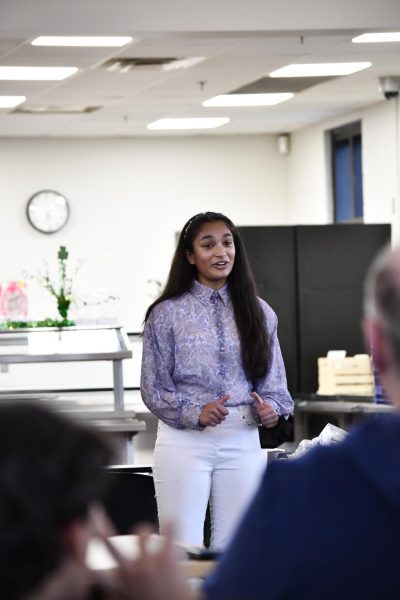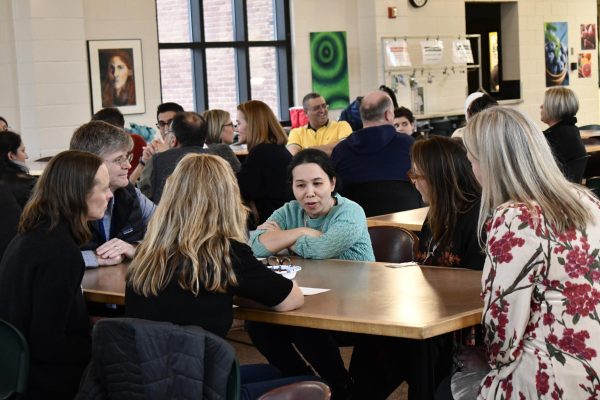Wednesday presented a rare yet valuable trifecta of opportunities: a space for interfaith gathering, a platform to discuss and learn, and, of course, a potluck of delicious food.
The description above refers to SPA’s first Interfaith Iftar, which occurred from 5:30-8:30 p.m. on March 14. Ramadan, the ninth month in the Muslim calendar, refers to a sacred time when the Holy Qu’ran was sent down from Heaven. Those who observe Ramadan often fast from sunrise to sunset, an opportunity for deepening faith and seeking repentance for past sins. Before fasting, Muslims may wake up before dawn for the meal Suhoor. Iftar is the meal eaten at sundown upon breaking one’s fast.

At the beginning of the event, guests milled around, and event organizers put the food dishes into warmers to keep ready. The Iftar drew a crowd of all ages, including many families with children in the Lower and Middle schools. There were guests of different faiths, races and ages, some contributing dishes for the potluck, and others simply there to learn and participate. Once everyone was seated, Asad Masood, advisor of the Muslim Student Association (MSA), introduced John Bellaimey from the Minnesota Multifaith Network, a former religion teacher at Breck. Both helped facilitate discussions throughout the night.
After briefly describing the meaning of multifaith work, students split into two groups while the adults discussed at tables in the cafeteria. The prompts centered around faith at SPA and in individual lives. Some students shared their experiences of religious differences with their parents, and one single faith did not dominate the discussion. Other topics included the nuances of sharing religion with those who are atheists or do not have knowledge of one’s faith and reflection on levels of religious observance.
After the discussion in small groups, all guests reconvened in the cafeteria to discuss how to foster understanding. “What’s something you wish your parents understood?” Bellaimey asked the students. With self-reflection fresh in their minds, many students were ready for a more extensive discussion of how faith plays a role in their lives.
The Maghrib prayer was recited before the food was served at sundown, scheduled for 7:20 p.m. The Maghrib is the fourth of five daily prayers that Muslims perform and is recited at sunset to mark the beginning of a new day. However, prayer can have different applications between Sunni and Shia Muslims, with Sunnis praying five times a day and Shiites condensing that into three. Afterward, event organizers served the food, and Muslim families broke their fast.
We thought it was a really good idea… to see what it’s like to break fast but then also talk about multiple different faiths in general.
— Nabeeha Qadri
Nabeeha Qadri, who spoke at the beginning of the event, said that the idea for an Interfaith Iftar originally came from a student at the Middle School.
“We thought it was a really good idea… to see what it’s like to break fast but then also talk about multiple different faiths in general,” Qadri said. She believes that diversity is a reason to come together in the SPA community and the broader country, and these events can help foster that space.
“I think it’s important because at SPA and in the world, there’s a lot of diversity. And especially America, we’re a country of immigrants. All of us were immigrants at one point or another. So we all have many different cultures, religions to share. So it’s important to represent that.”
One student at the event representing their faith was Jewish student David Kopilenko, co-president of the Jewish student affinity group Mishpacha. At the interfaith gathering, Kopilenko spoke of a “responsibility” to be present, both for other Jewish students and those who do not share his faith.

“Just to be someone open so anybody can talk to, but also if anybody has any questions, somebody to ask,” he said.
So, what does the interfaith model look like in the future? Those in the MSA feel optimistic about the possibilities. “We’d love to continue this in the future and have more people come. Since this is the first time, there’s always ways to improve,” Qadri, a group member, said.
Ramadan continues until April 9.